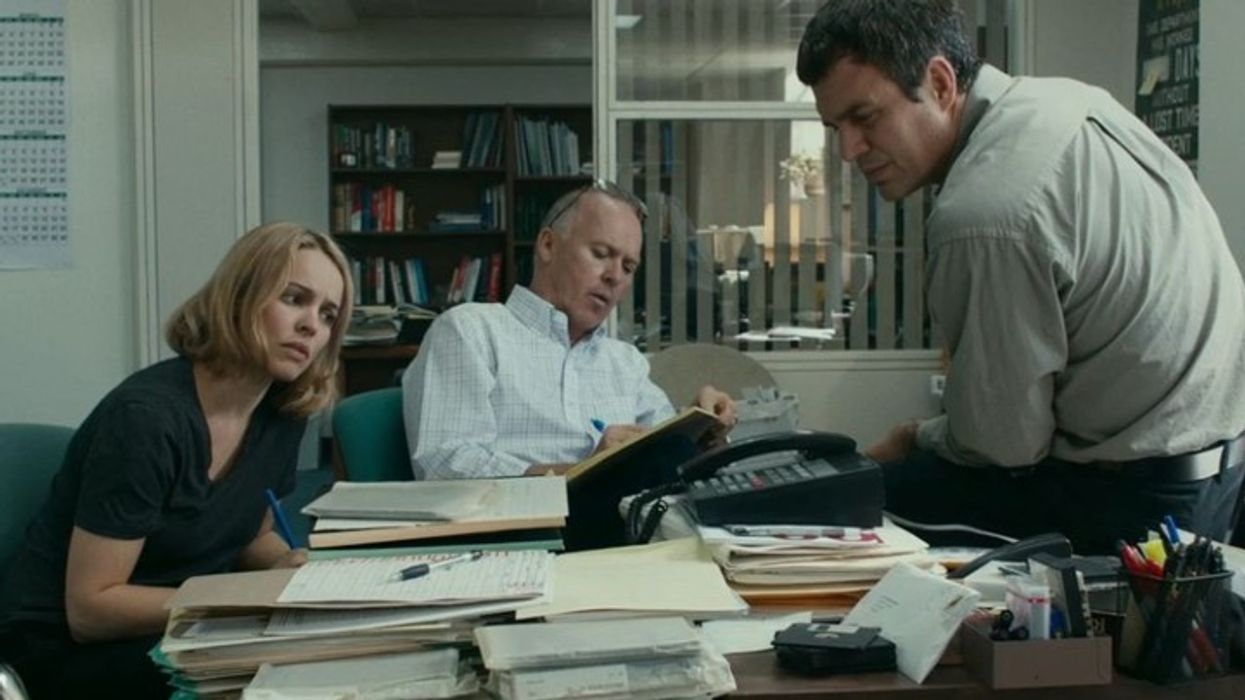3 Ways 'Spotlight' Turns the 'Boring Stuff' Into Exciting Drama
Spotlight is one of the best movies about investigative journalism ever, even though it features a bunch of reporters doing research and Googling. Find out why and how this script makes it all look so thrilling.

Have you ever tried to write about something and not known how to make it thrilling or how to best dramatize it?
What happens when the process and action in your story does not feel quite "cinematic?" Many filmmakers struggle with how to depict things like journalism on screen. So much of that job is reading, compiling facts, and talking to people. And if you're trying to tell a true story, many times there are not thrilling set-pieces or shootouts to amp up the adrenaline.
So how do movies like Spotlight find ways to be so exciting and dramatic?
Let's take a deep-ish dive into the Spotlight script and look at strategies you can employ in your own writing to dramatize these types of situations. Things that will help the reader and audience understand the importance of what is happening on screen and keep turning the pages while reading.
Check out this video from Nerdwriter and let's talk after the jump.
How 'Spotlight' Makes Boring Details Exciting to Watch
Spotlight won Best Picture at the Academy Awards and was lauded by critics and audiences. One of the most powerful things about the movie is how it felt like the entire story was going to bubble over at any point. It felt like a tea kettle heating up.
That urgency was both entertaining and made everything that happened on the screen keep you on the edge of your seat.
But when you really think about -- what actually happened on screen? A group of people got a story, did some research, made Excel spreadsheets, and then typed it all up into a document and printed it out. That kinda sounds, well, boring.
But it's not. It's one of the best movies of the last few years. And, like All The President's Men before it, it ranks high in the like echelons of movies about newspaper reporting by being a masterclass of filmmaking.
So what can you do to employ the same tactics when writing about journalists or investigations?
3 Ways Spotlight Turns the Mundane Into Rich Drama
1. Montage
When you think about movie montages, Rocky is one of the best ever.
Montages have gotten a bad wrap at times, but they are extremely useful when you need to show the amount of time and effort a person or group of people. And if your movie takes them seriously, your audience will too.
Spotlight uses to many montages you might not have known were happening. That's because the musical score is understated and the editing allows for shots to linger.
Check out how they are formatted on the page.
We are getting a countdown toward the deadline as we simultaneously are seeing the emotional investment each of the journalists have in the story -- all juxtaposed as they see victims breaking down.
But it's not just in the writing -- sometimes you need to make sure the direction and cinematography help support what hits the page.
2. Understatement by Design
As the Nerdwriter video mentions, understatement helps absorb you into the world. Instead of getting a stylistic portrayal of the world, director and co-writer Tom McCarthy keeps things muted and more true to life. This gives us almost a sense of voyeurism. We are just a fly on the wall of the process.
His framing and color choices contribute to these factors. Check out this clip from inside the office as they break down their findings. There's no camera trickery here. Just great acting and competent shots that deliver a gut punch.
3. Balance the Serious Subject Matter With Personal/Emotional Connections
This goes without saying, but if you have a weighty subject like Spotlight does, there's a better chance you'll keep people reading. I don't want to make light of the situation, but if you're sitting down to write one of these movies, make sure what you're covering matters.
So how can you make the topic shine? Get characters personally invested.
Spotlight does an excellent job showing what this story means to the characters involved.
One loses a marriage, one wants to protect his kids, another could lose her family, and the last is destroying a legacy he knows helped his life.
These personal stakes help amp up the importance of the story for the reader and viewer. We empathize and soon we're also invested.
What's next? Michael Haneke reveals how to write great scripts
In a recent interview with The Paris Review, filmmaker Michael Haneke shared his views on what makes for good storytelling in screenplays.
Read more!


















